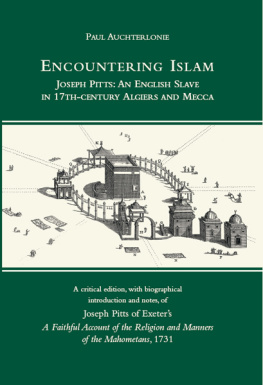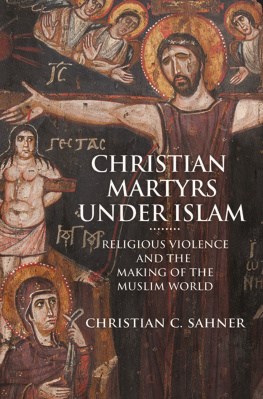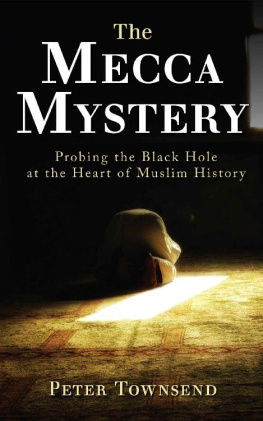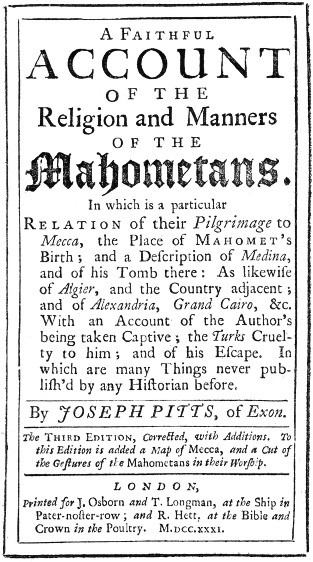
Title page, at actual size, of A Faithful Account of the Religion and Manners of the Mahometans, 1731

Encountering Islam: Joseph Pitts: An English Slave
in 17th-century Algiers and Mecca.
A critical edition of Joseph Pitts of Exeters A Faithful Account of the Religion and
Manners of the Mahometans, 1731
By Paul Auchterlonie
Arabian Publishing Ltd 2012
Produced and published in 2012 by Arabian Publishing Ltd
4 Bloomsbury Place, London WC2A 2QA
Email:
Edited by William Facey

Published in association with the BFSA
The moral right of the author has been asserted according to the
Copyright, Designs and Patents Act 1988
All rights are reserved. No part of this publication may be reproduced, stored or
introduced into a retrieval system, or transmitted, in any form, or by any means
(electronic, mechanical, photocopying, recording or otherwise) without prior
permission in writing of the publisher and copyright holder.
A catalogue card for this book is available from the British Library
ISBN: 978-0-9558894-9-3
EPUB ISBN: 9780957106062
MOBI ISBN: 9780957106079
PDF ISBN: 9780957106086
Typesetting and digital artwork by Jamie Crocker, Artista-Design, UK
Printed and bound by TJ International, Cornwall, UK
C ONTENTS
Joseph Pitts: Sailor, Slave, Traveller, Pilgrim
By Paul Auchterlonie
A Faithful Account of the Religion and Manners of the Mahometans, by Joseph Pitts of Exeter: the full 1731 text.
A CKNOWLEDGEMENTS
Many people have helped me with this work. I would like to thank in particular Wafa Iskander, Professor Sajjad Rizvi and Dr Clmence-Yucel of the Institute of Arab and Islamic Studies, University of Exeter, and Sara Yontan Musnik of the Bibliothque Nationale de France, for assistance on linguistic issues. I am grateful too to Dr Gareth Cole and Dr Christine Faunch of Exeter University Library for advice on bibliographical matters. In particular, I would like to thank the director of Arabian Publishing, William Facey, who commissioned this book, and whose editorial expertise and attention to detail immeasurably improved the quality of the whole work. Special thanks go also to Mrs Lindy Ayubi, who produced the excellent transcription of Pittss text and whose skill in copy-editing greatly enhanced the Introduction, and to Peter Colvin, who generously deciphered Pittss often opaque transcriptions of 17th-century Turkish for me. Above all, I owe a great debt to my wife, Mitzi, who has shared my interest in Joseph Pitts and given the project constant support and encouragement.
Paul Auchterlonie
Exeter, January 2012
N OTE ON T RANSLITERATION AND T RANSCRIPTION
System of transliteration
Well-known Arabic and Turkish names and technical terms have been left in their familiar English form, for example Algiers, Oran, Cairo, Mecca, Medina, Janissary, Pasha, Agha. Arabic names and terms have been transliterated according to the system adopted by Arabian Publishing, which is based on that used in New Arabian Studies. Turkish names and terms have been rendered according to the norms of modern Turkish orthography. All quotations from the Bible in the notes to the text are from the King James version, since that is the one Joseph Pitts would have been familiar with.
Transcription of Pittss text ()
The text forming refer to the relevant page in the 1731 edition, unless indicated otherwise.
L IST OF M APS AND I LLUSTRATIONS
Maps
Illustrations
M APS
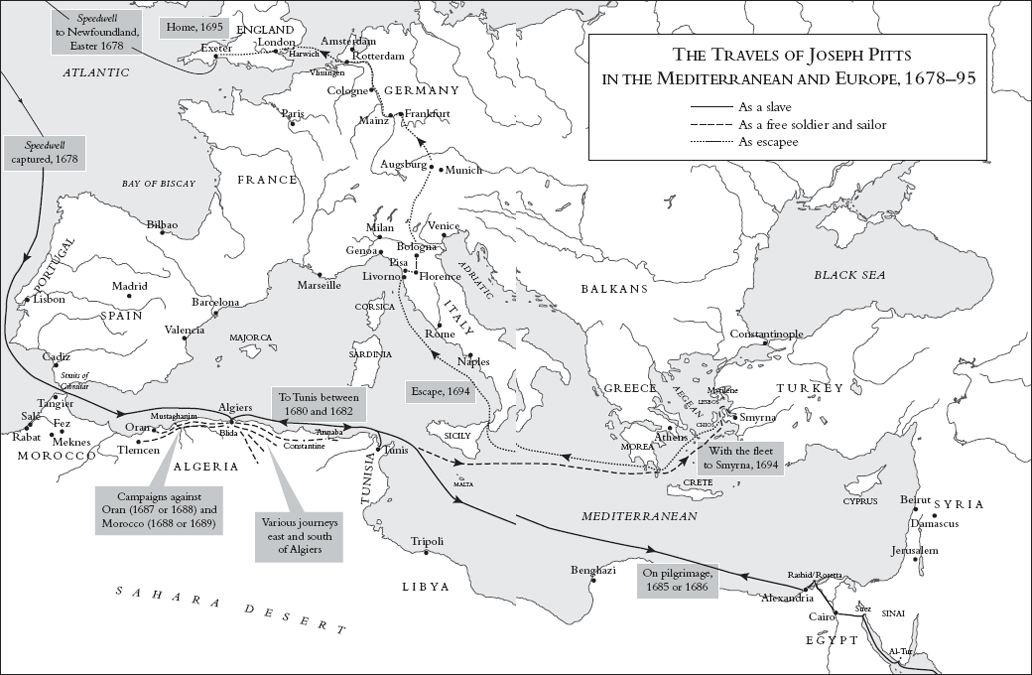
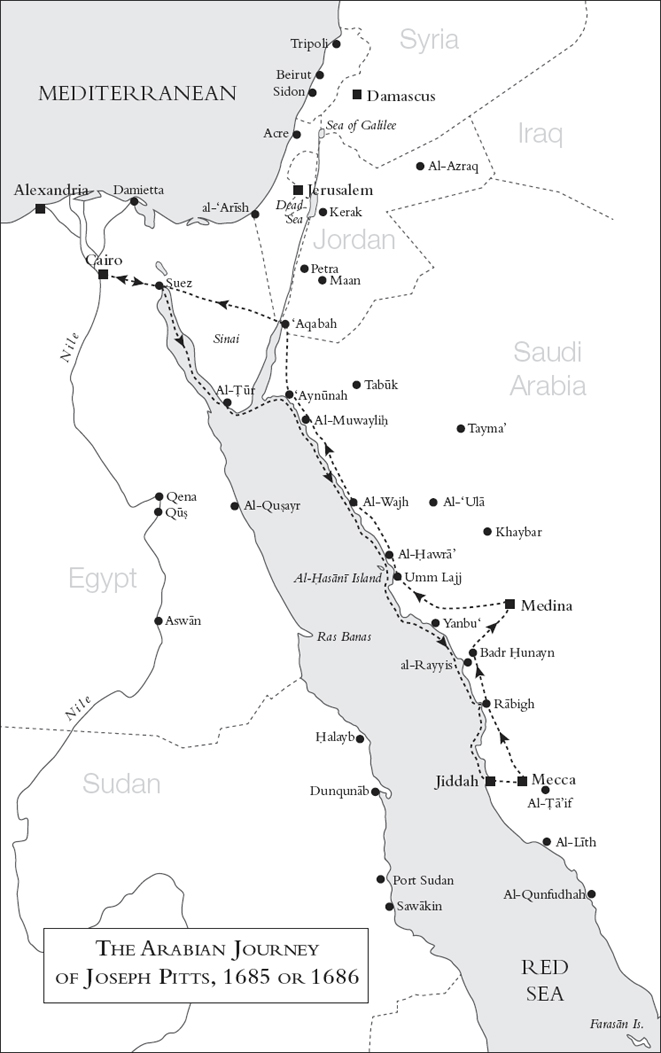
P ART I
J OSEPH P ITTS : S AILOR, S LAVE, T RAVELLER, P ILGRIM
By Paul Auchterlonie
I NTRODUCTION
AF AITHFUL A CCOUNT of the Religion and Manners of the Mahometans by Joseph Pitts is an intriguing and, as far as is known, unique combination of three distinct genres: captivity narrative, travel account, and description of Islam. There are 17th- and 18th-century English books combining two of these three elements but, on the face of it, no author other than Pitts combines all three strands within a single work.
To fully evaluate and appreciate these aspects, it is important to place the book in the context of what is known about Pittss life and personality, and the milieu in which he grew up. Vital as background too are the history of the Barbary States, how they were created, how they became economically dependent on slavery and ransom, how they were governed, and how they interacted with Christian Europe. Also needed is an understanding of what it was like to be a slave in Algiers, Tripoli or Tunis, how slaves were treated, what their relationship was to their masters, and what happened if a slave renounced Christianity and turned Turk. From the point of view of travel, it is necessary to discover how Pittss description of the places he visited relates to previous and subsequent travellers, whether he was accurate, and how much he knew about earlier travel accounts. Crucial to understanding Pittss account of Islam, and his view of Barbary society, are the way Islam was viewed in contemporary England and the extent of awareness of the actual rites and practices of the religion. A judgement can then be made as to whether Pitts adds anything to the knowledge of the time. Is he still worth reading for the information he imparts, for the Zeitgeist he embodies, for the adventurous tale he tells, or for a combination of all three? Did he give the 18th-century English-speaking public new facts and insights about being a slave, about Algerian society, about Islam and about the Middle East in general, or did he just tell a good story, set against the background of commonly held beliefs and information? In short, was his book really ground-breaking and unique in its time?
Captivity narratives were an interesting sub-genre of literature between and the providentialist adventures of Britons escaping from infidel slavery in North Africa fitted into this category very neatly.
During the 19th century and the first half of the 20th, English captivity narratives were all but forgotten. A few were republished as adventures,
The real transformation in captivity studies, however, came about with the publication of Nabil Matars trilogy,
While captivity narratives in general languished in unwarranted neglect for almost 200 years until this extraordinary efflorescence of activity towards the end of the 20th century, Pitts by contrast has always maintained a presence in historical surveys of Arabian exploration, due to his achievement as the first recorded Englishman to visit Mecca and to write about it. Pittss account of his visit to the Muslim Holy Places occupies a significant place in the classic work by Sir Richard Burton (182190), Personal Narrative of a Pilgrimage to Al Madinah and Meccah, since this edition includes detailed geographical, linguistic and other notes, which help to clarify precisely where Pitts went and what he did.
Next page
